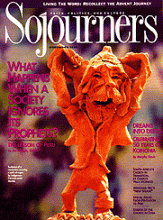As we prepare for a new administration, it seems appropriate to look back over recent history at the driving forces that have brought us to where we are. One recent book, Chain Reaction: The Impact of Race, Rights, and Taxes on American Politics (W.W. Norton, 1991, $22.95, cloth), by Thomas Byrne Edsall and Mary D. Edsall, is a brilliant interpretation of the preceding three decades in American political life.
The Edsalls offer the most compelling explanation I have seen about the part race has played in recent electoral politics. While everyone knows (or should know) the reality of this premise, few have articulated in such depth and breadth America's obsession with race.
Issues related to race and taxes illustrate the great divide between Democratic liberalism and the mass of American voters. By examining these political and "cultural" issues, the Democrats' single victory in the last six national elections - while maintaining a clear advantage in local and state offices - is set in context.
The Edsalls point out that the problems of the Democratic Party in particular, and liberalism in general, stemmed not only from the power of the opposition, but also from the failure of liberalism itself. The liberal coalition of the New Deal gave way to a new coalition that pitted former allies against each other.
It costs money to correct a history of racial inequity. In order to support social programs to rectify the injustice, taxes must be increased (if defense expenditures are also to be raised). Raising taxes becomes an exploitable issue within the middle classes, thus excusing those who oppose the anti-racism policies in the first place.
Read the Full Article

